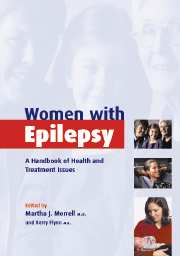Book contents
- Frontmatter
- Contents
- List of contributors
- Part I The woman with epilepsy
- 1 Introduction: why we wrote this book
- 2 On being a woman with epilepsy
- 3 The woman with epilepsy: a historical perspective
- 4 Quality of life issues for women with epilepsy
- Part II Epilepsy diagnosis and treatment
- Part III Hormones and the brain
- Part IV Health challenges for women with epilepsy
- Part V Family planning, pregnancy, and parenting
- Part VI Living well with epilepsy
- Appendix: The Epilepsy Foundation's Campaign for Women's Health: bringing help and hope to women with epilepsy
- Index
1 - Introduction: why we wrote this book
from Part I - The woman with epilepsy
Published online by Cambridge University Press: 02 November 2009
- Frontmatter
- Contents
- List of contributors
- Part I The woman with epilepsy
- 1 Introduction: why we wrote this book
- 2 On being a woman with epilepsy
- 3 The woman with epilepsy: a historical perspective
- 4 Quality of life issues for women with epilepsy
- Part II Epilepsy diagnosis and treatment
- Part III Hormones and the brain
- Part IV Health challenges for women with epilepsy
- Part V Family planning, pregnancy, and parenting
- Part VI Living well with epilepsy
- Appendix: The Epilepsy Foundation's Campaign for Women's Health: bringing help and hope to women with epilepsy
- Index
Summary
Martha J. Morrell is a Professor of Neurology at Columbia University, College of Physicians and Surgeons in New York City and is Director of the Columbia Comprehensive Epilepsy Center at New York Presbyterian Hospital. She has been elected an International Ambassador for Epilepsy by the International League Against Epilepsy and she chairs the National Epilepsy Foundation. Dr Morrell is the principal investigator on a number of epilepsy research trials examining reproductive health and hormones in women with epilepsy and bone health in women receiving antiepileptic drugs.
MJMIn many ways, epilepsy is a different disease in a woman than in a man. The differences arise because of biological differences between women and men, but also because of the different social roles they play. As a result of these biological and social differences, women with epilepsy face special challenges, especially in the area of reproductive health (Table 1.1).
The experiential differences between women and men with epilepsy became clear to me in the very earliest years of my career as a neurologist specializing in the treatment of epilepsy. My background had been in studying the effects of male and female sex hormones on certain types of behavior, so I was well aware of the significant effects these hormones could have on many brain centers. Therefore, I was not at all surprised when women with epilepsy explained to me that their seizures appeared to vary with their menstrual cycles.
Keywords
- Type
- Chapter
- Information
- Women with EpilepsyA Handbook of Health and Treatment Issues, pp. 3 - 6Publisher: Cambridge University PressPrint publication year: 2003

